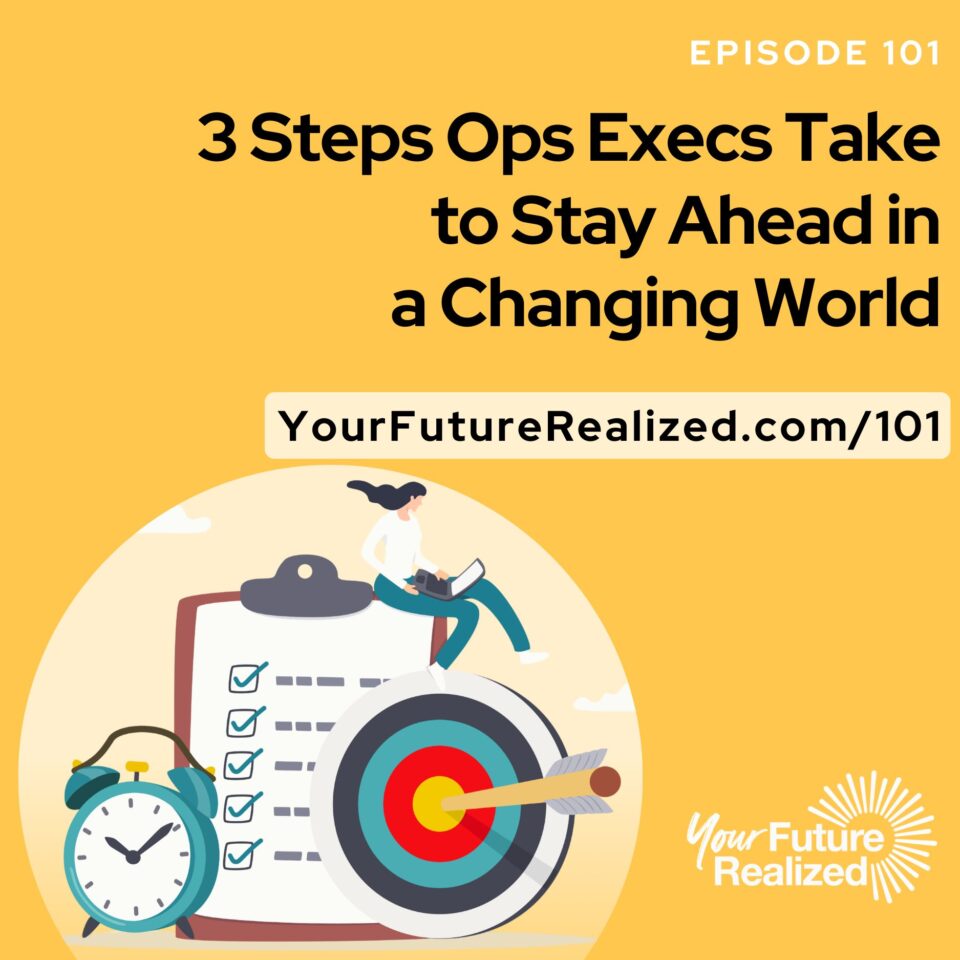How many of your meetings truly move the needle?
I recently worked with someone whose days were full of urgent meetings that didn’t deserve her time. We looked at each one: Why it was there, what it specifically was for, and if she really had to attend.
She found nearly a third were there out of habit. This kept her stuck reacting, firefighting, and never moving forward on the things that really matter most to her.
Saying “no” was tough at first—but the payoff came fast. She carved out a bigger slice of time for deep work and strategy, time to think ahead, not just react.
Is your routine building your future or maintaining your past?
In this episode, discover how to shift hard-to-break habits—and why it matters for future-proofing yourself and your team.
Understanding the Calendar Trap Facing Ops Executives
If your days are full of endless fires, glitches, tech rollouts, back-to-back meetings – welcome to ops leadership in the weeds.
I know you know that, while you are firefighting today, chances to prepare for tomorrow are slipping away. New technologies, process improvements, AI, sustainability goals, and evolving leadership approaches all get drowned out by the urgent noise.
This tension between urgent and the important trips up nearly every ops leader. It’s not a flaw. It’s a reality of the role. I’ve coached many ops leaders through this. And honestly, it’s a tough habit to break. I’ve struggled with it too.
Old habits hold you hostage. It’s common to hear yourself saying “yes” to urgent but unessential meetings and reacting because delegating or saying “no” feels risky or even impossible. You’re not alone in that.
But it leaves you with stalled growth—both for your operations and for your career.
I am in awe of ops leaders, the way you keep things humming quietly, with relentless skill and care. The most impactful ops leaders choose to find a way to shape their future deliberately, not just react to what’s happening.
So, what’s the way forward?
The Future State Check-In: A Simple Habit for Long-Term Success
Try the “Future State Check-In,” a simple habit that only takes 10 minutes, but can shake up your routine. It helps you stop arguing for limitations and start exploring possibilities.
- Start by picturing your role and team in the future—what success looks like, the skills you lead with, and trends you’ve caught. Imagine this as far ahead as feels right—whether that’s five years or just six months from now. The key is to focus on what would make your role and team stronger in the long run.
- Next, pick one skill or habit to develop to do your best work in that future. Maybe it’s a deeper fluency with new tech, a stronger ability to handle conflict among remote teams, or simply creating consistent space and time to think strategically.
- Then, take a small step toward it, like perhaps blocking weekly future-focused time or trying something new on a project.
This is not a one-time exercise. Make it a recurring habit. Because the truth is, time is your ally, once you’ve taken control of it.
Coaching Question: What Will Your Future Self Thank You For?
I’ll leave you with this question: If you spent 10 minutes imagining your future leadership role today, what would you start doing differently tomorrow? What skill or connection would you wish you’d invested in now?
What do you notice when you take this lens to your calendar and your team? Where might small shifts make a difference?
So, give it a try, and let me know how it goes.
Ready to move beyond daily ops and lead more strategically? Episode 30 shows how ops execs shift their thinking, spot new opportunities, build better relationships, and make decisions that shape the future. Listen in at yourfuturerealized.com/30.
You can’t stop the chaos, but you can change the game.

